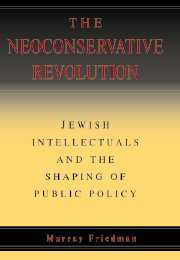Book contents
- Frontmatter
- Contents
- Introduction: American Jews in an Age of Conservatism
- 1 Jews and the Making of the Cosmopolitan Culture
- 2 The Premature Jewish Neoconservatives
- 3 Forgotten Jewish Godfathers
- 4 The Liberal Civil War
- 5 The Modernization of American Conservatism
- 6 The Liberal Meltdown
- 7 The Rise of the Neoconservatives
- 8 Neoconservatives and the Reagan Revolution
- 9 Nicaragua: The Cold War Comes to This Hemisphere
- 10 Irving Kristol and a New Vision of Capitalism
- 11 The Neoconservative Assault on the Counterculture
- 12 Jews and the Christian Right
- 13 Epilogue
- Notes
- Index
8 - Neoconservatives and the Reagan Revolution
Published online by Cambridge University Press: 05 June 2012
- Frontmatter
- Contents
- Introduction: American Jews in an Age of Conservatism
- 1 Jews and the Making of the Cosmopolitan Culture
- 2 The Premature Jewish Neoconservatives
- 3 Forgotten Jewish Godfathers
- 4 The Liberal Civil War
- 5 The Modernization of American Conservatism
- 6 The Liberal Meltdown
- 7 The Rise of the Neoconservatives
- 8 Neoconservatives and the Reagan Revolution
- 9 Nicaragua: The Cold War Comes to This Hemisphere
- 10 Irving Kristol and a New Vision of Capitalism
- 11 The Neoconservative Assault on the Counterculture
- 12 Jews and the Christian Right
- 13 Epilogue
- Notes
- Index
Summary
The 1972 election marked a turning point in the evolution into neoconservatives of some of the Democratic liberals. Until then, except for Kristol, who had voted for Nixon in 1968, and Moynihan, who had entered the Nixon administration, the neocons had remained loyal Democrats. Since the start of the Cold War, they had supported hard-line anticommunism and strong national defense, which had generally been endorsed by both political parties.
In the view of most neocons, McGovern, a former Henry Wallace supporter, turned his back on this tradition in his 1972 campaign. His call for cooperation with the Soviet Union ignored, or at least minimized, what they perceived as the perils posed by that country's aggressive designs in the world. They were deeply suspicious of a candidate for president who charged that American foreign policy was based on “outdated stereotypes of military confrontation and power politics.” Indeed, these disgruntled liberals were convinced that the McGovernites had hijacked their party and jettisoned liberalism as they had known it.
Although McGovern lost forty-nine of the fifty states and was finished politically, his dovish views resonated within important elements of America's intellectual and cultural elite. The Cold War had been waged as a siege in Europe and as a series of duels elsewhere, chiefly in Korea and Indochina. The Nixon administration's policy of détente had accommodated the status quo by relying heavily on a huge build-up of nuclear weapons by both the United States and the USSR to maintain the peace.
- Type
- Chapter
- Information
- The Neoconservative RevolutionJewish Intellectuals and the Shaping of Public Policy, pp. 137 - 160Publisher: Cambridge University PressPrint publication year: 2005



